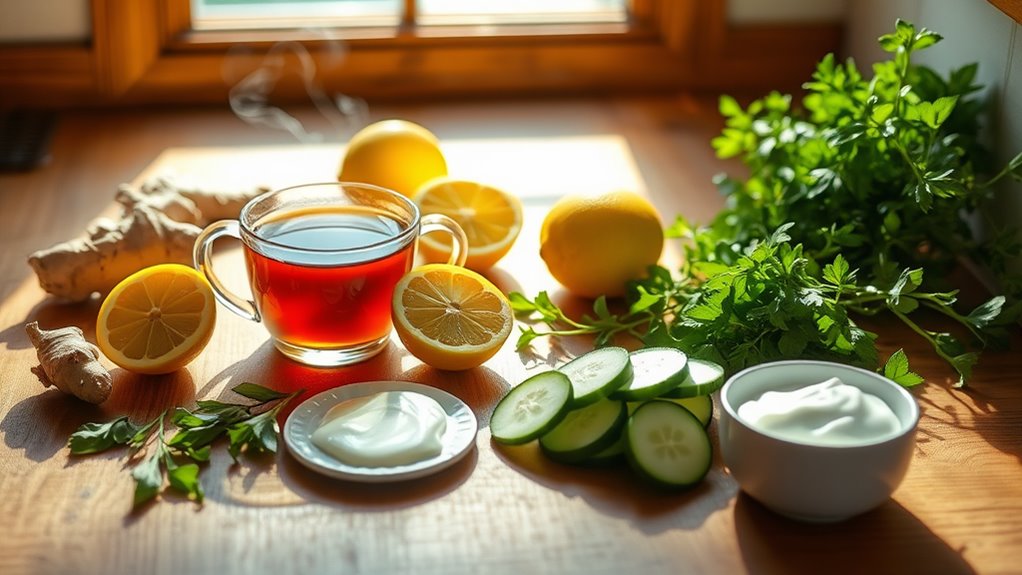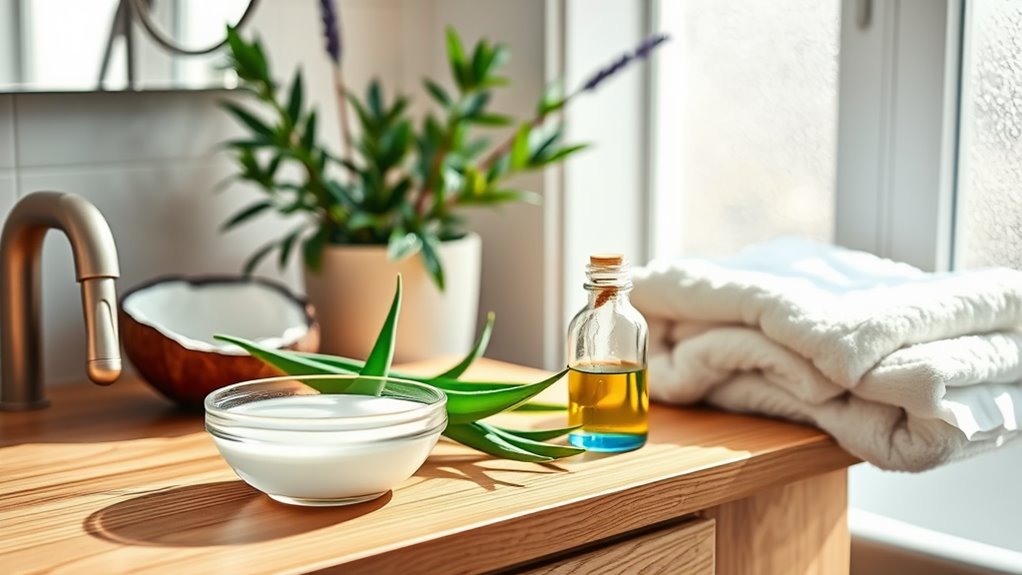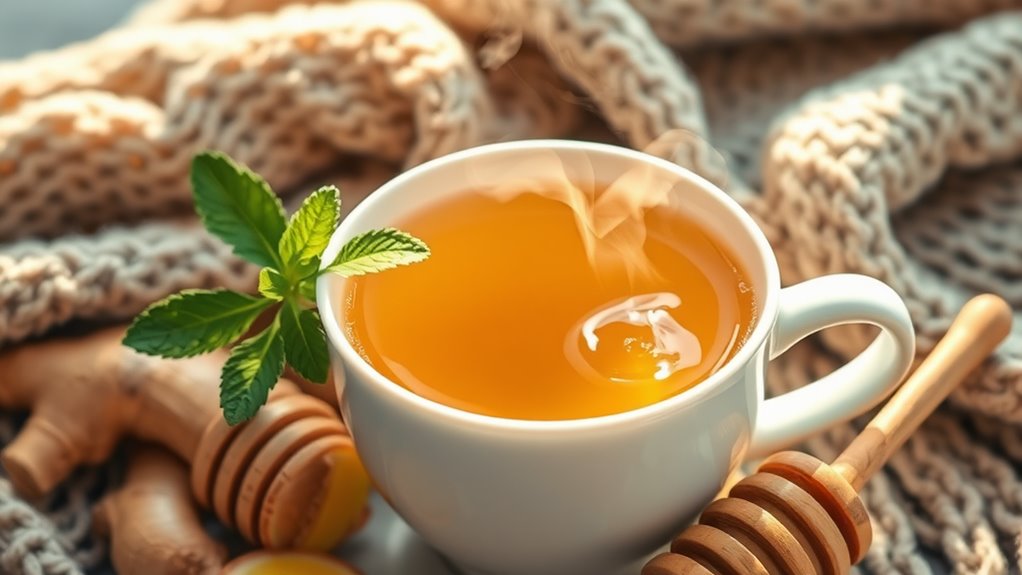Fast Relief for a Bloated Belly-Naturally
Your bloated belly can feel like it’s about to burst, making even the simplest tasks uncomfortable. Fortunately, there are natural strategies you can employ to find fast relief. By understanding the causes of bloating and adjusting your diet, you can start to ease your discomfort. Plus, incorporating certain herbal remedies and hydration techniques can make a significant difference. Curious how these methods can transform your experience? Let’s explore effective solutions together.
Key Takeaways
- Sip on peppermint tea to relax digestive muscles and alleviate discomfort quickly.
- Incorporate ginger into your diet to promote digestion and reduce inflammation effectively.
- Engage in gentle exercises like the Child’s Pose to relax the abdomen and encourage gas release.
- Drink plenty of water to aid digestion and prevent constipation, enhancing overall comfort.
- Keep a food diary to identify triggers and adjust your diet for better digestive health.
Understanding Bloating and Its Causes
Have you ever wondered why your belly feels bloated after certain meals?
Bloating occurs when gas or fluid builds up in your gastrointestinal tract, often triggered by overeating, food intolerances, or high-fiber foods.
Your body’s response can lead to discomfort and a swollen appearance.
To alleviate this, you might explore natural bloated belly remedies such as peppermint tea, ginger, or gentle abdominal massage.
Staying hydrated and incorporating probiotics into your diet can also support digestion. Keeping a food diary can help you identify specific triggers and make informed dietary choices.
Understanding these causes helps you make informed choices, minimizing discomfort and promoting overall gut health.
Addressing bloating holistically empowers you to feel your best.
Dietary Adjustments for Immediate Relief
Making dietary adjustments can provide immediate relief from bloating.
Start by reducing your intake of salty foods, as excess sodium can cause water retention. Focus on incorporating easily digestible foods like bananas, rice, and yogurt, which can soothe your digestive system.
Try eating smaller, more frequent meals instead of large ones to prevent overwhelming your stomach. Avoid carbonated beverages, as they introduce gas, and limit high-fiber foods like beans and cruciferous vegetables, which can cause gas buildup.
Staying hydrated with water can also aid digestion. Adequate hydration is essential for preventing constipation and reducing bloating. These simple changes can help alleviate discomfort and promote a healthier gut.
Herbal Remedies to Soothe Bloating
When it comes to soothing bloating, herbal remedies can offer effective relief thanks to their natural properties.
Peppermint tea is known for its ability to relax digestive muscles, easing discomfort. Ginger promotes digestion and can reduce inflammation, making it a great choice. Fennel seeds help expel gas and relieve cramping, while chamomile tea calms the digestive tract. Dandelion root may support liver function, aiding in digestion. Incorporating these herbs into your routine can provide gentle, natural relief without harsh side effects. Regular physical activity can also enhance the effectiveness of these remedies by promoting digestion. Always consult a healthcare professional before starting any new herbal regimen, especially if you have existing health conditions.
The Role of Hydration in Digestion
Staying properly hydrated is essential for effective digestion and overall gut health.
When you drink enough water, it helps break down food and absorb nutrients more efficiently, reducing the risk of bloating.
Timing your hydration—such as drinking water before meals—can further enhance your digestive process and comfort. Additionally, proper hydration supports production of digestive juices necessary for proper food breakdown.
Importance of Water Intake
How often do you think about the role water plays in your digestion?
Staying hydrated is essential for breaking down food and absorbing nutrients.
Water helps your stomach produce gastric juices, ensuring everything moves smoothly through your digestive tract.
When you’re dehydrated, digestion can slow down, leading to discomfort and bloating.
Additionally, water softens stool, preventing constipation and promoting regular bowel movements.
Aim to drink enough water throughout the day to support your digestive health.
Hydration and Gut Health
Hydration plays an essential role in maintaining gut health and ensuring efficient digestion.
When you’re adequately hydrated, your digestive system functions efficiently, breaking down food and absorbing nutrients effectively.
Water helps dissolve nutrients and fiber, preventing constipation and promoting regular bowel movements.
It also supports the production of digestive juices, which are essential for nutrient absorption.
Dehydration can lead to digestive issues like bloating and discomfort, as it slows down your gut motility.
Timing Hydration for Digestion
When should you drink water to support effective digestion?
Aim to hydrate before meals, as this can help prepare your digestive system. Drinking water about 30 minutes prior allows your stomach to produce digestive juices more efficiently.
During meals, sip water in moderation; too much can dilute digestive enzymes.
After eating, wait at least an hour before drinking large amounts, as this helps your body absorb nutrients better.
Staying consistently hydrated throughout the day is essential, too, as it aids in breaking down food and keeping your digestive tract functioning smoothly.
Balance is key for ideal digestive health!
Gentle Exercises to Alleviate Discomfort
Gentle exercises can stimulate digestion and relieve discomfort.
Here are three effective options:
-
Knee-to-Chest Stretch: Lie on your back and pull your knees toward your chest. Hold for 20-30 seconds to release tension in your abdomen.
-
Torso Twist: Sit cross-legged and gently twist your torso to one side, then the other. This helps improve circulation and digestion.
-
Child’s Pose: Kneel and sit back on your heels, stretching your arms forward. This pose relaxes your abdomen and encourages gas release.
Incorporate these movements into your routine for quick relief! Additionally, practicing gentle yoga poses can help release trapped gas and alleviate bloating.
Lifestyle Changes for Long-Term Relief
Have you considered how your daily habits impact bloating? Making some lifestyle changes can offer you long-term relief.
Start by prioritizing hydration—drinking enough water helps digestion and reduces bloating.
Incorporate a balanced diet rich in fiber, which promotes healthy gut bacteria.
Pay attention to portion sizes and eat slowly to avoid swallowing excess air.
Regular physical activity, like walking or yoga, can enhance digestion.
Also, manage stress through mindfulness practices, as stress can exacerbate bloating.
Finally, consider keeping a food diary to identify potential triggers, allowing you to make informed dietary choices for lasting comfort. Additionally, practicing mindful eating can help reduce the chances of overeating and improve overall digestive health.




